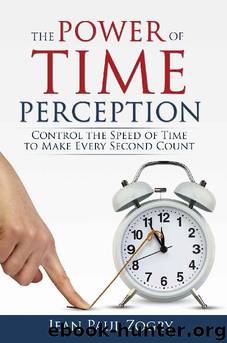The Power of Time Perception by Jean Paul Zogby

Author:Jean Paul Zogby [Zogby, Jean Paul]
Language: eng
Format: epub
ISBN: 9780995734791
Publisher: Time Lighthouse Publishing
Published: 2017-03-31T04:00:00+00:00
“Extroverts’ internal clocks tick up to 30% slower than introverts”
How Quickly Do You Get Bored?
Another trait that affects our perceived speed of time is how easily we get bored. We have all experienced a lazy, boring Sunday morning that crawls or a busy Monday morning that passes in a flash. Ask any elderly person living in a care home how he feels about time. He will tell you it is passing very slowly due to the monotony of days. 93 Boredom is a transient, unpleasant emotional state that is experienced when you are left without anything in particular to do or when you lose interest in your surroundings.
Existential philosophers, like Jean-Paul Sartre and Albert Camus, claim that boredom is just a human response to the meaninglessness of life. They assert that no matter how much enjoyment you get from something, sooner or later you will get bored with it and start looking for something new. No matter how many new experiences you engage in or how many interesting things you are able to buy, you will eventually get bored. This urge to keep busy with novelty and to escape the present is our greatest source of unhappiness, argues the distinguished Danish philosopher, Kierkegaard. According to these great thinkers, boredom is essentially a part of life, an inescapable aspect of the human condition.
Today's teenagers, in particular, are more vulnerable to boredom due to a combination of overstimulation from TV, computers, tablets, mobile phones, and a lack of coping skills when the action dies down. If you asked teenagers in the 19th century what they did in their free time, they would probably talk about helping their parents at work. If you ask the same question to teenagers in the mid-1990s, you might get an answer related to baseball, football, or the latest playground craze. But nowadays, most teens would say they spent their free time playing video games or scrolling through social media. Studies reveal that American teenagers spend an average of 6.5 hours a day focused on electronic devices. This invasion of electronic products into children’s lives causes over-simulation. They are in constant search of more stimulation and when that is not found, they are bored. For many teenagers, being bored seems to be the new cool. This is reflected in clothing that suggests a bored blasé attitude to life is far cooler than the usual enthusiasm that characterizes young children. This effort to curb enthusiasm is also seen in many adults. We seem to be living in an age where it is trendy to look perpetually bored, dissatisfied, and uninterested! But is there a scientific basis for this boredom syndrome? And how does it affect our perception of time?
One aspect of Dr. Eysenck’s arousal theory is that we all seem to have a basic boredom threshold, and this is unique to each of us. It is defined as the amount of stimulation we must receive before we feel mentally aroused, and it determines our innate vulnerability to boredom. Introverts
Download
This site does not store any files on its server. We only index and link to content provided by other sites. Please contact the content providers to delete copyright contents if any and email us, we'll remove relevant links or contents immediately.
Rewire Your Anxious Brain by Catherine M. Pittman(18640)
Talking to Strangers by Malcolm Gladwell(13344)
The Art of Thinking Clearly by Rolf Dobelli(10446)
Mindhunter: Inside the FBI's Elite Serial Crime Unit by John E. Douglas & Mark Olshaker(9313)
Becoming Supernatural by Dr. Joe Dispenza(8196)
Change Your Questions, Change Your Life by Marilee Adams(7754)
Nudge - Improving Decisions about Health, Wealth, and Happiness by Thaler Sunstein(7689)
The Road Less Traveled by M. Scott Peck(7592)
The Lost Art of Listening by Michael P. Nichols(7487)
Mastermind: How to Think Like Sherlock Holmes by Maria Konnikova(7315)
Enlightenment Now: The Case for Reason, Science, Humanism, and Progress by Steven Pinker(7305)
Win Bigly by Scott Adams(7183)
The Way of Zen by Alan W. Watts(6595)
Daring Greatly by Brene Brown(6501)
Big Magic: Creative Living Beyond Fear by Elizabeth Gilbert(5753)
Grit by Angela Duckworth(5601)
Ego Is the Enemy by Ryan Holiday(5412)
Men In Love by Nancy Friday(5232)
The Laws of Human Nature by Robert Greene(5170)
